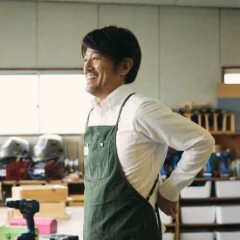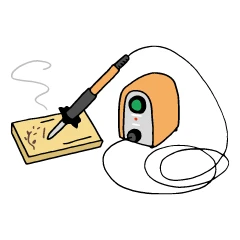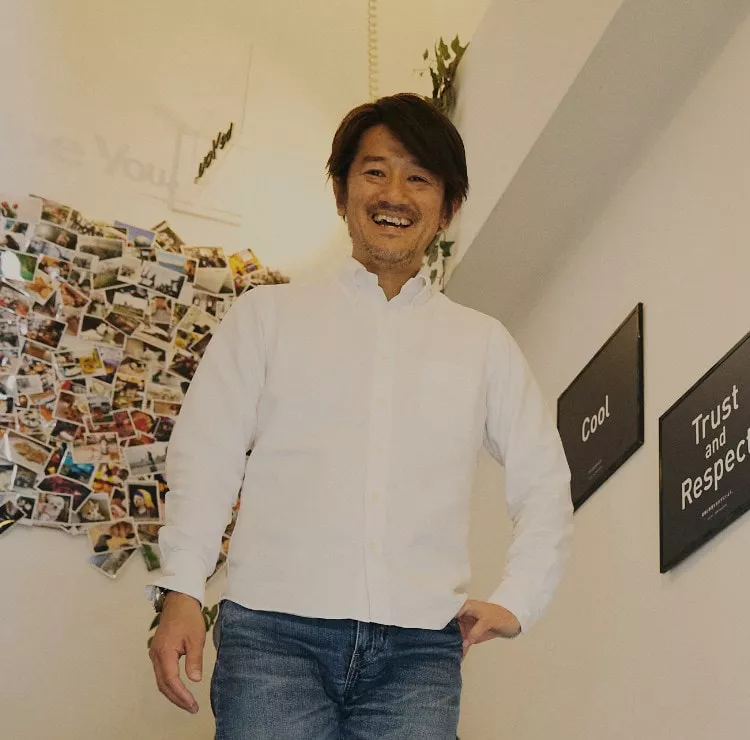In this interview series, we invited people to reflect on their life while looking back on their history with Rakuten. We asked Takahito Yamada, the third-generation owner of Daito Corporation, one of the first merchants to establish a store specializing in tools on Rakuten Ichiba, and a promoter of DIY since the days when the term was still largely unknown, about his past successes and dreams for the future.
Without any expertise,
he changed his business model from wholesale to online retail.

Rakuten: This year is Rakuten’s 25th anniversary. What were you doing 25 years ago?
Takahito Yamada: It was just the year I changed jobs from my previous one to Daito (a long-established tool wholesale company). The year before that, I married the only daughter of Daito's predecessor, which was a turning point in my life. When I went to greet her on her wedding day, she asked me to be their successor. I had no knowledge of the industry, but I had always wanted to start my own business, and I took the job on the spot.
Rakuten: At that time, you were in the wholesale business. Can you walk us through what happened from joining Daito to launching your own shop on Rakuten Ichiba?
Takahito Yamada: The wholesale business model itself was already on the decline. At the time, we were trying things without any real clear sense of direction – and the business results were not looking good.
Rakuten: I see. So you came across online retail and Rakuten as a new way to reach customers?
Takahito Yamada: That's right. It all started at the end of 2001, when I was at a year-end party with my classmates and one of my friends told me that the age of online shopping was coming. The next day, I immediately went to buy a computer, but with zero knowledge, I didn’t know where to start. In the course of my research, I learned about Rakuten, attended an information session and began attending Rakuten University to learn how to launch a store without any expertise. I managed to open our online store in July 2002.
Our first customer was from Fukushima.
I was really excited to think that a company from Osaka could do business with people from Fukushima.

Rakuten: What was the first product you sold?
Takahito Yamada: It was an electrically heated pen called "My Pen." It is mainly used as a wood burning tool, in which the pen burns a picture or pattern on a piece of wood.
Rakuten: This is the first time I’ve heard of it. Why did you decide to sell an electrothermal pen?
Takahito Yamada: Originally, we were distributing this product to home centers, but there weren’t many stores that carried it. At that time, when online shopping was in its infancy, customers shopped at brick-and-mortar stores for what they had in stock and looked online for what they could not find. One of our criteria was to select products that were rare in stores but sold a certain number of units, and My Pen fulfilled that criteria. Incidentally, I still remember the first product we sold: A night vision scope priced at 30,000 yen, which was bought by a customer in Fukushima Prefecture. I was truly surprised and excited, thinking, "How can a company from Osaka do business with people in Fukushima without any sales effort?”
Rakuten: One of the most interesting aspects of online shopping is that you can shop at stores all over the world, even in places you can't visit in real life. Were you managing the store by yourself at that time?
Takahito Yamada: Yes. I decided that I would work by myself until the monthly sales reached one million yen, and I mainly did order processing and shipping at night. It was tough because I couldn't go home properly when I was busy, but I was highly motivated because I felt that this was my dream job. Orders increased little by little, and after a year and a half I was able to achieve that one million yen goal. Then I finally hired an employee who was good with computers on a full-time basis, and that really boosted the quality of the store. We were able to respond to orders rapidly and ship quickly, and we began to communicate with customers, which made me regret not hiring someone sooner. Since then, we have been actively hiring people.
I want to expand DIY culture in Japan and increase the number of people who create their own unique lifestyle.

Rakuten: After your store got off the ground, was there another turning point for you?
Takahito Yamada: One turning point was in 2007, when we changed our store’s focus from being a variety store to becoming a specialty tool store. Until then, we had been a variety store, expanding our product lineup and selling not only tools but also everything from humidifiers to folding bicycles. We had a bit of a crisis when we saw many competitors in this type of business emerging, and we shifted to a specialty tool store in order to leverage our unique strengths as a wholesaler of tools. The big challenge was how to make ourselves stand out amid an increasing number of online stores.
Rakuten: I think it’s a challenge for many stores to create a unique identity so that they’re the one chosen by customers from a pool of so many potential stores.
Takahito Yamada: I decided to differentiate myself from other stores by having an overwhelming number of products. At the time, we handled 18,000 items, which was already one of the largest in Japan. But we had data for 100,000 items as a wholesaler, so I aimed to register all of them, and we managed to achieve that.
Rakuten: 100,000 items! That's amazing.
Takahito Yamada: We were able to differentiate our products in this way, and sales increased rapidly from 2010, which was good. However, we did not have a system in place to handle it, and our employees and I had to work from morning till night. We couldn't even go home. We had to work late into the night packing products, and we began to ask ourselves, "Why in the world are we doing this?"
Rakuten: So the bottleneck of the business shifted from sales to the backyard work? This is a difficult problem caused by rapid business growth.
Takahito Yamada: Yes. However, this led me to re-evaluate the core mission of our company, and after much thought and consideration, I finally arrived at the company's current mission, "Happy Triangle." There are people who create products with great skill and enthusiasm. There are people who deliver those products to those who need them. Then there are those who use the products to create something for their own personal lives. In this way, all three parties involved are happy. Once we defined what we wanted to see, our doubts disappeared.
Rakuten: So you now know what you should aim for?
Takahito Yamada: That's right. First of all, I want to make my company the best DIY company in Japan. Then, I want to spread DIY culture throughout the country, increase the number of people who create their own unique lifestyles, and create a world full of "character." That is my current dream and goal. Looking back, I became involved in the wholesale tool business through a chance encounter. In fact, I hated it at first. To be honest, I wanted to quit the company. Not only was it not profitable, it wasn’t my dream. But I came to love the business because I figured out what I wanted to do for the rest of my life. Now, even if I had to do it all over again, I would want to be a toolmaker again.

Takahito Yamada was born in Ishikawa Prefecture in 1969. After graduating from university, he joined Recruit Co., Ltd.. and worked as a sales representative in human resource recruitment for 6 years before joining Daito. In 2011, he became the president of Daito. He has won several awards from Rakuten Ichiba, including the Rakuten Shop of the Year Grand Prize in the DIY category. In 2014 he opened the hands-on DIY store "DIY FACTORY OSAKA" (now closed) and continues to make efforts to spread DIY to the world.

The first tool exhibited at DIY FACTORY, this is a tool with a high-temperature nib used for charring wood, leather and other materials to decorate letters, pictures, patterns and more. A useful tool for making original goods, the temperature can be adjusted on a scale of one to ten, and the shade of the burn marks can be freely adjusted.
Back to Top
